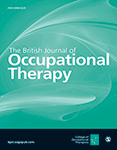
British Journal of Occupational Therapy
Scope & Guideline
Advancing Occupational Therapy Excellence
Introduction
Aims and Scopes
- Promoting Evidence-Based Practices:
The journal emphasizes the importance of evidence-based occupational therapy practices, promoting rigorous research methodologies and systematic reviews that inform clinical decision-making and enhance patient outcomes. - Advancing Professional Development:
BJOT focuses on the educational aspects of occupational therapy, including the development of curricula, training programs, and continuing professional education to support the growth of practitioners. - Exploring Client-Centered Approaches:
The journal highlights research that centers on client involvement and the co-production of care, ensuring that therapy is tailored to individual needs and experiences. - Innovative Interventions and Technologies:
BJOT publishes studies on new interventions, including the integration of digital technologies and telehealth in occupational therapy, reflecting the evolving landscape of healthcare. - Addressing Diversity and Inclusion:
The journal actively promotes research that explores the experiences of diverse populations, including marginalized communities, and the role of occupational therapy in promoting health equity. - Mental Health and Wellbeing:
A significant focus of BJOT is on the intersection of occupational therapy with mental health, exploring interventions that enhance wellbeing and participation among individuals with mental health challenges. - Occupational Performance and Participation:
The journal examines factors that influence occupational performance and participation in daily activities, contributing to a better understanding of the role of occupational therapy in enhancing quality of life.
Trending and Emerging
- Telehealth and Digital Interventions:
Research on telehealth and digital interventions has surged, particularly following the COVID-19 pandemic, showcasing how technology can enhance service delivery and access to care. - Social Prescribing and Community Engagement:
There is a growing emphasis on social prescribing as a model for enhancing occupational engagement, with studies exploring how occupational therapy can contribute to broader community health initiatives. - Mental Health Interventions:
A notable increase in publications addressing mental health interventions reflects the profession's commitment to supporting the well-being of individuals facing mental health challenges. - Cultural Competence and Diversity:
Emerging research highlights the importance of cultural competence in occupational therapy practice, focusing on how therapists can better serve diverse populations and address systemic inequalities. - Holistic and Integrative Approaches:
The trend towards holistic and integrative approaches in occupational therapy is evident, with a focus on understanding the interconnectedness of physical, emotional, and social factors in client care. - Research in Occupational Identity and Meaning:
An increasing number of studies are exploring occupational identity and the meaning of occupations, particularly in the context of chronic conditions and life transitions. - Family-Centered Practices:
There is a rising interest in family-centered practices in occupational therapy, emphasizing the role of family members in the therapeutic process and the importance of their involvement in care.
Declining or Waning
- Traditional Rehabilitation Models:
Research focused on conventional rehabilitation models appears to be waning as the field shifts towards more holistic and client-centered approaches that prioritize individual experiences and preferences. - Single-Domain Interventions:
There is a noticeable decline in studies that evaluate single-domain interventions, as the profession increasingly embraces multi-dimensional approaches that consider various aspects of a person's life and well-being. - Basic Assessments and Tools:
The publication of studies solely focused on basic assessment tools is decreasing, reflecting a shift towards more comprehensive and integrated assessment frameworks that capture the complexity of occupational performance. - Generalized Population Studies:
Research targeting generalized populations without specific focus on vulnerable or marginalized groups is becoming less frequent, indicating a growing recognition of the need for tailored interventions. - Non-Evidence Based Practices:
The journal is moving away from studies that lack rigorous methodological frameworks, emphasizing the importance of robust evidence to support occupational therapy practices.
Similar Journals
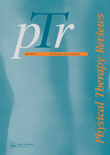
Physical Therapy Reviews
Bridging research and practice in sports medicine.Physical Therapy Reviews is a distinguished journal published by Taylor & Francis Ltd that serves as a vital resource for researchers, clinicians, and students within the fields of physical therapy, rehabilitation, and sports medicine. With an ISSN of 1083-3196 and an E-ISSN of 1743-288X, this journal has earned its place in the academic community, categorized in the 2023 Q3 quartiles for Orthopedics and Sports Medicine, Physical Therapy, Sports Therapy and Rehabilitation, and Rehabilitation. Although it is not an open-access journal, the research published within its pages contributes significantly to the understanding and advancement of therapeutic practices and interventions. Covering a spectrum of topics from evidence-based clinical practices to rehabilitation techniques, Physical Therapy Reviews aims to enhance knowledge and foster innovation, making it an essential tool for anyone engaged in the health professions and rehabilitation sectors. The journal's continued commitment to high-quality scholarship ensures that it remains a relevant and impactful publication through its converged years from 1996 to 2024.
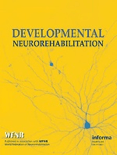
Developmental Neurorehabilitation
Advancing therapeutic innovation for developmental recovery.Developmental Neurorehabilitation is an esteemed journal published by Taylor & Francis Inc, dedicated to advancing the field of developmental neuroscience and rehabilitation. With an ISSN of 1751-8423 and an E-ISSN of 1751-8431, this journal serves as a vital resource for researchers, clinicians, and students interested in innovative therapeutic approaches and rehabilitation techniques for children and adolescents. Since its inception in 1997, Developmental Neurorehabilitation has focused on disseminating high-quality research, contributing to a deeper understanding of recovery processes in developmental disorders, and facilitating interdisciplinary dialogue among professionals. With its recognition in Q2 and Q3 quartiles across prominent categories such as Pediatrics and Rehabilitation, it stands out as a pivotal publication in its field, boasting Scopus rankings that reflect its significant impact—ranked #53 in Rehabilitation and #139 in Pediatrics, among others. While maintaining a commitment to quality research, the journal does not currently offer open access but remains accessible through institutional subscriptions, further enriching the academic landscape with critical insights into rehabilitation methodologies for developmental challenges and promoting better clinical practices to improve patient outcomes.
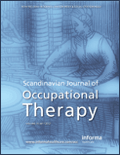
Scandinavian Journal of Occupational Therapy
Fostering academic growth for tomorrow's healthcare leaders.The Scandinavian Journal of Occupational Therapy, published by Taylor & Francis Ltd, is a leading journal in the field of occupational therapy, dedicated to advancing evidence-based practices and multidisciplinary approaches in rehabilitation and public health. With an impressive Q1 ranking in Occupational Therapy and a significant position in the Q2 category for Public Health, this journal is pivotal for researchers, practitioners, and students interested in the latest advancements and methodologies in their discipline. With a convergence of studies from 1994 to 2024, the journal provides a rich repository of peer-reviewed articles that span diverse topics within occupational therapy and its implications for public health, environmental sustainability, and holistic patient care. Readers benefit from valuable insights that not only foster academic growth but also enhance practical applications in their professional arenas. As the journal continues to grow in impact and reputation, it remains a critical resource for those committed to improving health outcomes through innovative occupational therapy practices.

Rehabilitation Research and Practice
Fostering Collaboration in Rehabilitation and Therapy.Rehabilitation Research and Practice is a distinguished open-access journal published by HINDAWI LTD, dedicated to advancing knowledge in the fields of rehabilitation, physical therapy, and sports therapy. With its ISSN 2090-2867 and E-ISSN 2090-2875, the journal has been a pivotal resource for researchers and practitioners since its inception in 2010. Based in Egypt and reaching an international audience, the journal encapsulates cutting-edge research and evidence-based practices that significantly contribute to patient care and rehabilitation strategies. Notably, it holds a reputable position in the Scopus rankings—42nd out of 161 in Medicine Rehabilitation and 74th out of 247 in Health Professions. The journal enjoys a Q2 status in the 2023 category quartiles, reflecting its influence and quality within the academic community. The journal's commitment to an open-access format not only enhances its visibility and accessibility but also fosters collaboration among professionals, making it an indispensable resource for anyone engaged in rehabilitation research and practice.

Occupational Therapy in Mental Health
Fostering Dialogue for Better Therapeutic PracticesOccupational Therapy in Mental Health, published by Routledge Journals, Taylor & Francis Ltd, is a pivotal resource for professionals and researchers in the fields of mental health, occupational therapy, and applied psychology. With a rich publication history dating back to 1980 and continuing to the present, the journal offers a platform for innovative research and discussions that bridge occupational therapy practices with mental health outcomes. Although currently categorized in the fourth quartile across various disciplines, it fosters a growing discourse within the community, aiming to elevate therapeutic practices and understanding of mental health interventions. The journal is committed to sharing empirical studies, literature reviews, and case studies that inform and enhance clinical practice, making it an essential read for practitioners, educators, and students alike. The journal welcomes submissions that explore the intersection of occupational therapy and mental health, contributing to the dialogue on improving patient care and outcomes in diverse settings.
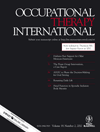
Occupational Therapy International
Pioneering research for a healthier tomorrow.Occupational Therapy International, published by WILEY-HINDAWI, stands as a leading peer-reviewed journal dedicated to advancing the field of occupational therapy. With an ISSN of 0966-7903 and an E-ISSN of 1557-0703, this journal has been an essential resource for researchers and practitioners since its inception in 1994. As an Open Access journal since 2017, it has significantly increased accessibility to innovative research, promoting the dissemination of knowledge and best practices within the discipline. Positioned in the Q2 quartile for Occupational Therapy and ranked #9 out of 31 in Scopus for Health Professions, this journal features high-quality studies that inform clinical practice and contribute to evidence-based interventions. The globally relevant research is enriched by contributions from various perspectives, making it a vital resource for those committed to improving life quality through occupational therapy. Stationed in London, England, the journal continues to reflect its international scope with contributions spanning diverse health systems and cultural contexts, paving the way for future advancements in therapy practices.
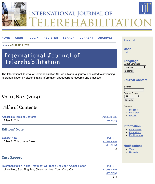
International Journal of Telerehabilitation
Exploring the future of health from a distance.The International Journal of Telerehabilitation, published by the University of Pittsburgh, University Library System, serves as a premier platform dedicated to advancing research in the emerging field of telerehabilitation. With an open access publishing model since 2009, this journal ensures that vital research findings are readily available to a diverse audience, which includes researchers, practitioners, and students. Covering key disciplines such as health informatics, rehabilitation, and computer science applications, the journal has earned notable rankings, positioning itself in the Q1 category within rehabilitation and Q2 in multiple related fields for 2023. Its impact is underscored by its rankings in Scopus, reflecting a strong commitment to enhancing accessibility and efficacy in health services. The journal endeavors to explore innovative approaches and technologies that enhance rehabilitation practices through telecommunication, paving the way for future developments in patient care and professional training. Researchers and professionals alike are encouraged to contribute to this vital discourse, making the journal an essential resource in the landscape of telehealth and rehabilitation.
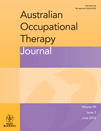
Australian Occupational Therapy Journal
Fostering Evidence-Based Practices for Tomorrow.Australian Occupational Therapy Journal, published by WILEY, stands as a premier platform for the dissemination of vital research and practice advancements in the field of occupational therapy. With a prestigious Q1 classification and ranking #6 out of 31 in the Health Professions category, it reflects a strong influence in the global scientific community, as evidenced by its 82nd percentile ranking on Scopus. The journal has been committed to promoting innovative practices and evidence-based research since its inception in 1952. Although it does not currently offer open access options, it continues to lead discussions on key topics in occupational therapy which are essential for researchers, professionals, and students who seek to be at the forefront of this evolving field. With a robust submission process to ensure high-quality publications, the journal invites contributions that further enrich the discourse surrounding diverse occupational therapy practices and policies.

Physiotherapy
Empowering Professionals with Cutting-Edge KnowledgePhysiotherapy, published by Elsevier Science Ltd, stands as a prestigious journal in the field of Physical Therapy, Sports Therapy, and Rehabilitation. Since its inception in 1945, this journal has been committed to advancing the practice and science of physiotherapy through rigorous peer-reviewed research, making significant contributions to both clinical practice and academia. With an impressive Q1 ranking and a Scopus percentile of 88th, it is widely regarded as a leading source of evidence-based information for professionals and researchers alike. The journal operates without an Open Access option, which ensures that it maintains the quality and integrity of the research it publishes while providing exclusive access to valuable insights for its subscribers. By focusing on diverse topics within its scope, including therapeutic techniques, rehabilitation strategies, and sports medicine, Physiotherapy continues to shape the future of physiotherapy practice and education, making it an essential resource for anyone invested in this dynamic field.
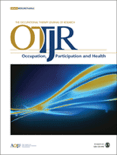
OTJR-Occupational Therapy Journal of Research
Shaping the Landscape of Occupational Therapy KnowledgeOTJR-Occupational Therapy Journal of Research, published by SAGE Publications Inc, stands at the forefront of the occupational therapy field, presenting pioneering research from 2002 to 2023. With an impressive Q1 ranking in the Occupational Therapy category, this journal holds a prominent position among its peers, reflected in its 75th percentile ranking in Scopus and a dedicated readership of researchers, professionals, and students alike. The journal serves as a vital platform for disseminating high-quality research findings, clinical practices, and innovative methodologies that shape the future of occupational therapy. As the field rapidly evolves, OTJR invites contributions that reflect diverse perspectives and foster an evidence-based understanding of therapeutic practices. Though currently not open access, the journal remains committed to accessibility and broad dissemination of knowledge, ensuring that its impactful research reaches audiences who contribute to enhancing the quality of patient care and advancing the profession.